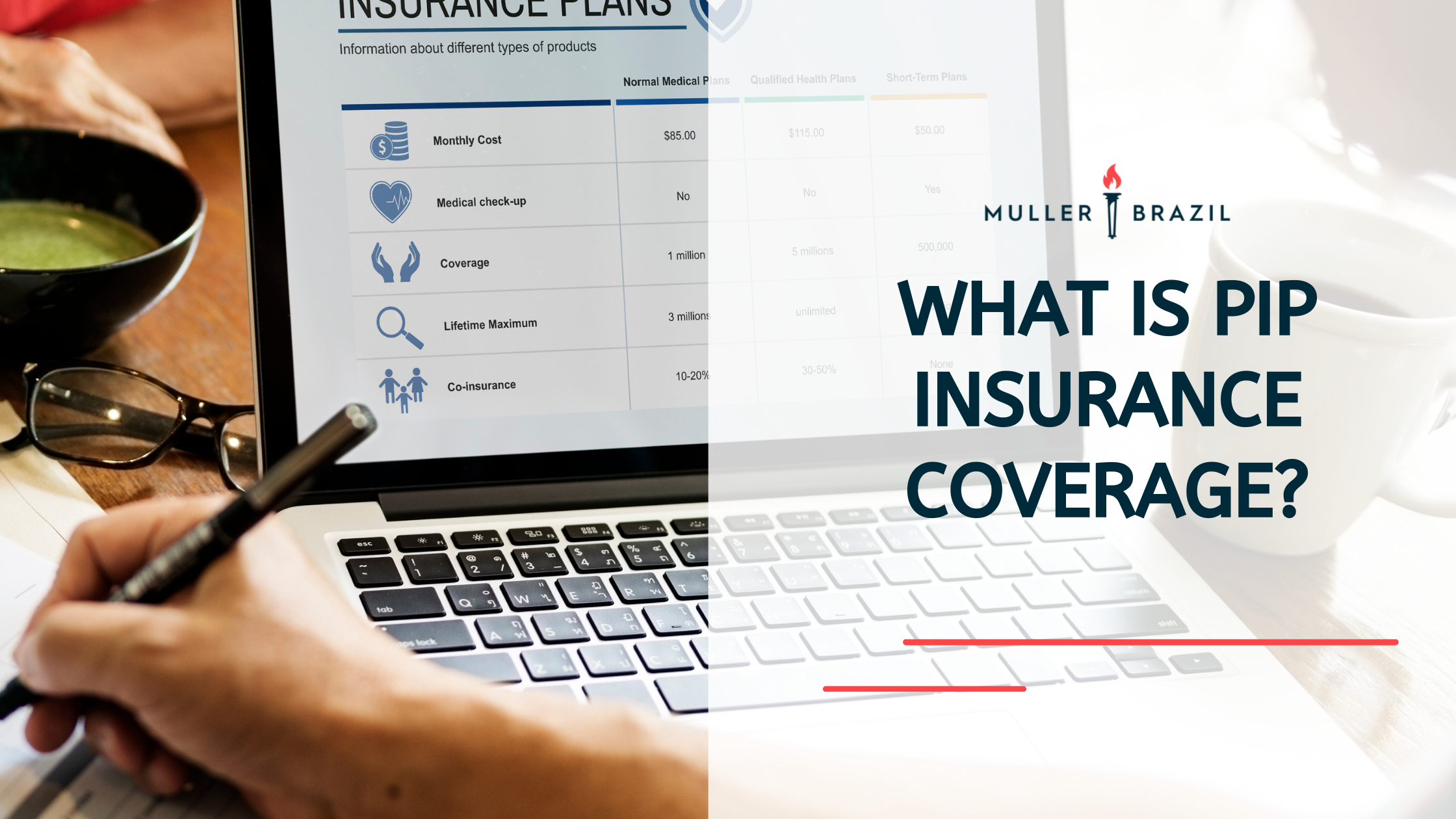Personal Injury Protection (PIP) insurance provides immediate financial assistance for medical expenses, lost wages, and other costs after a car accident, regardless of fault. PIP does not cover property damage or injuries to other drivers. In this blog, you will understand the PIP's benefits and how it helps ensure you have the necessary protection and financial support in the event of an accident.
What is PIP Insurance?
Personal Injury Protection (PIP) insurance is a type of auto insurance designed to cover:
- medical expenses
- lost wages
- other non-medical costs related to an auto accident, regardless of who is at fault
This coverage provides immediate financial assistance to policyholders and their passengers, ensuring that medical bills, child care, and even funeral expenses are taken care of promptly. PIP insurance is particularly significant in no-fault states, where it's a mandatory requirement. Currently, 15 states and Puerto Rico require drivers to carry PIP coverage, with limits typically extending up to $25,000.
If a driver in a no-fault state, like Pennsylvania, is involved in a car accident, PIP insurance can cover the medical expenses for injuries sustained by the driver and any passengers without the need to determine who was responsible for the accident. This immediate coverage helps make sure that medical care is not delayed due to procedural hurdles.
Coverage Details of PIP Insurance
PIP insurance is thorough in its scope, covering many expenses beyond just medical bills. It includes coverage for:
- lost wages
- household services
- disability and rehabilitation costs
- death benefits in the event of a fatal car accident
This extensive coverage makes sure that individuals can focus on recovery without worrying about financial burdens resulting from an accident.
It's important to note that PIP insurance does not cover:
- damages to property
- injuries to other drivers involved in the accident
- injuries resulting from criminal activities
- injuries sustained while being paid for driving, such as in the case of a delivery driver
An example of PIP coverage in action would be a person who, after an accident, cannot perform their job or household tasks due to injury. PIP helps compensate for their lost wages and pay for necessary services like childcare or cleaning until they can resume these activities.
Working Mechanism of PIP Insurance
The primary goal of PIP insurance in no-fault states is to streamline the process following an auto accident by limiting the need for litigation to recover medical expenses and lost wages. This helps reduce auto insurance costs and ensures quick financial assistance to accident victims. In states where PIP is not mandated, drivers may opt for medical payment coverage as an alternative for covering funeral expenses and hospital bills, usually up to a $10,000 limit.
Consider a scenario in which a no-fault state individual is involved in a car accident. Instead of waiting for court hearings or legal battles, PIP insurance covers the individual's medical expenses and other covered losses, allowing them to focus on recovery.
Comparison: PIP Insurance vs. Medical Payments Coverage
While PIP insurance and Medical Payments Coverage (MedPay) cover medical costs incurred from auto accidents, PIP offers broader protection. PIP includes additional benefits such as coverage for lost wages, childcare services, and funeral expenses.
On the other hand, MedPay focuses solely on medical expenses for the policyholder, passengers, and family members involved in an accident, regardless of fault, and can cover:
- doctor visits
- hospital stays
- surgery, X-rays
- other related medical bills
A notable difference is that while MedPay can be beneficial for covering immediate medical expenses, PIP insurance's broader scope offers a more complete safety net following an accident.
State-Specific Requirements for PIP Insurance
PIP insurance is mandatory in some no-fault states, such as Pennsylvania, to help cover medical expenses and limit lawsuits. This helps streamline the process following an auto accident. Each no-fault state has its own specific requirements regarding PIP coverage, with variations in terms of whether PIP is optional or required and the extent of coverage provided.
For instance, in Washington state, the state's Office of the Insurance Commissioner clearly outlines the details of PIP coverage and requirements. This makes sure that drivers are well-informed about the coverage level they need according to state laws.
Cost Considerations and Selection Tips for PIP Insurance
When choosing PIP insurance, it's important to understand the coverage limitations, exclusions, and how it complements existing health coverage. Evaluating the costs involves assessing coverage limits, exclusions, and overall affordability based on individual needs and state requirements. This careful consideration helps policyholders select a PIP policy that offers adequate protection without unnecessary expense.
For example, Drivers with comprehensive health insurance can choose lower PIP coverage on their car insurance. This saves money while protecting them if they get hurt in an accident.
What does PIP insurance cover?
PIP insurance covers a wide range of expenses related to a car accident, including:
- Medical expenses: Hospital stays, doctor's visits, surgeries, X-rays, medications, rehabilitation, and other necessary medical care.
- Lost wages: Compensation for income you can't earn due to injuries preventing you from working.
- Essential services: Coverage for household help (cleaning, childcare, etc.) if unable to perform these tasks yourself.
- Funeral expenses: Covers costs associated with a death caused by a car accident.
What are my PIP options in Pennsylvania?
Pennsylvania gives you more control over your coverage than most states. You must choose between:
- Full Tort: This lets you sue for pain and suffering after an accident caused by someone else. Your premiums will likely be higher.
- Limited Tort: This generally gives you lower premiums, but you can only sue for pain and suffering if you have a serious injury.
Regardless of your tort option, you must carry at least $5,000 in PIP medical benefits. You can choose higher limits for more protection.
Is PIP insurance required in my state?
PIP insurance is mandatory in 12 states as of December of 2021. These states are considered no-fault states. Here's a list to check if your state has this requirement:
- Florida
- Hawaii
- Kansas
- Kentucky (offers a choice of no-fault or some ability to sue)
- Massachusetts
- Michigan
- Minnesota
- New Jersey (offers a choice of no-fault or some ability to sue)
- New York
- North Dakota
- Pennsylvania (offers a choice of no-fault or some ability to sue)
- Utah
States with optional PIP:
- Arkansas
- Connecticut
- District of Columbia
- Texas
- Washington
Delaware, Oregon, and Maryland are called "no-fault states" because they have no-fault insurance laws, which means they operate under a no-fault insurance system. However, unlike the other 12 states with no-fault insurance laws, these states might have variations in the details of their insurance regulations or the implementation of their no-fault systems.
If your state does not require PIP coverage, it may be offered as optional coverage and is recommended.
/
How much PIP coverage do I need?
The right amount of PIP coverage depends on several factors:
- State minimums: If PIP is mandatory in your state, there will be a minimum coverage amount you must carry.
- Your health insurance: If you have comprehensive health coverage with low deductibles, you may need less PIP. If your health coverage has gaps, consider a higher PIP limit.
- Your income: PIP's lost wage benefits are more important if you're the primary earner. Assess how much you'd need to stay afloat if unable to work.
It's best to speak with an insurance agent to get personalized advice.
How does PIP work with other types of insurance?
PIP is designed to complement your existing insurance policies:
- Health insurance: PIP can cover deductibles, co-pays, and services your health insurance might not (like household help).
- Liability insurance: While liability covers damage to others, PIP focuses on your own expenses.
- Medical payments coverage (MedPay): MedPay is similar to PIP but typically has lower limits and less extensive coverage.
Meet the Author
Paul Brazil - Founding Partner
Paul Brazil is a native of Dunmore, Pennsylvania and a graduate of Dunmore High School. For his undergraduate education, he attended Bloomsburg University where he majored in political science. He then went on to earn his JD from Widener University School of Law. Following graduation from law school, Mr. Brazil worked at a large Philadelphia civil defense firm where he litigated workers’ compensation claims and Heart and Lung Act cases.
Learn more about Paul Brazil ⇒





.jpg?width=429&height=241&name=What%20does%20PIP%20insurance%20cover%20(1).jpg)
